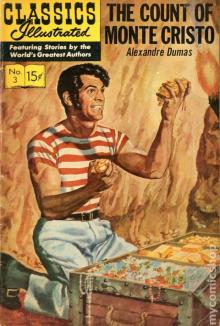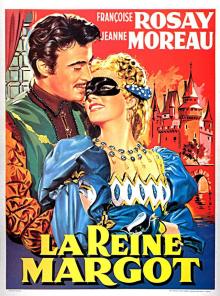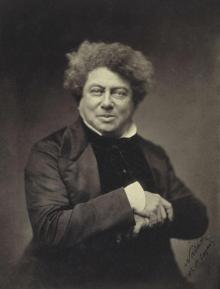- Home
- Alexandre Dumas
The Man in the Iron Mask Page 7
The Man in the Iron Mask Read online
Page 7
Chapter VI. The Bee-Hive, the Bees, and the Honey.
The bishop of Vannes, much annoyed at having met D'Artagnan at M.Percerin's, returned to Saint-Mande in no very good humor. Moliere,on the other hand, quite delighted at having made such a capital roughsketch, and at knowing where to find his original again, whenever heshould desire to convert his sketch into a picture, Moliere arrived inthe merriest of moods. All the first story of the left wing was occupiedby the most celebrated Epicureans in Paris, and those on the freestfooting in the house--every one in his compartment, like the bees intheir cells, employed in producing the honey intended for that royalcake which M. Fouquet proposed to offer his majesty Louis XIV. duringthe _fete_ at Vaux. Pelisson, his head leaning on his hand, was engagedin drawing out the plan of the prologue to the "Facheux," a comedy inthree acts, which was to be put on the stage by Poquelin de Moliere, asD'Artagnan called him, or Coquelin de Voliere, as Porthos styled him.Loret, with all the charming innocence of a gazetteer,--the gazetteersof all ages have always been so artless!--Loret was composing anaccount of the _fetes_ at Vaux, before those _fetes_ had taken place.La Fontaine sauntered about from one to the other, a peripatetic,absent-minded, boring, unbearable dreamer, who kept buzzing and hummingat everybody's elbow a thousand poetic abstractions. He so oftendisturbed Pelisson, that the latter, raising his head, crossly said, "Atleast, La Fontaine, supply me with a rhyme, since you have the run ofthe gardens at Parnassus."
"What rhyme do you want?" asked the _Fabler_ as Madame de Sevigne usedto call him.
"I want a rhyme to _lumiere_."
"_Orniere_," answered La Fontaine.
"Ah, but, my good friend, one cannot talk of _wheel-ruts_ whencelebrating the delights of Vaux," said Loret.
"Besides, it doesn't rhyme," answered Pelisson.
"What! doesn't rhyme!" cried La Fontaine, in surprise.
"Yes; you have an abominable habit, my friend,--a habit which will everprevent your becoming a poet of the first order. You rhyme in a slovenlymanner."
"Oh, oh, you think so, do you, Pelisson?"
"Yes, I do, indeed. Remember that a rhyme is never good so long as onecan find a better."
"Then I will never write anything again save in prose," said LaFontaine, who had taken up Pelisson's reproach in earnest. "Ah! I oftensuspected I was nothing but a rascally poet! Yes, 'tis the very truth."
"Do not say so; your remark is too sweeping, and there is much that isgood in your 'Fables.'"
"And to begin," continued La Fontaine, following up his idea, "I will goand burn a hundred verses I have just made."
"Where are your verses?"
"In my head."
"Well, if they are in your head you cannot burn them."
"True," said La Fontaine; "but if I do not burn them--"
"Well, what will happen if you do not burn them?"
"They will remain in my mind, and I shall never forget them!"
"The deuce!" cried Loret; "what a dangerous thing! One would go mad withit!"
"The deuce! the deuce!" repeated La Fontaine; "what can I do?"
"I have discovered the way," said Moliere, who had entered just at thispoint of the conversation.
"What way?"
"Write them first and burn them afterwards."
"How simple! Well, I should never have discovered that. What a mind thatdevil of a Moliere has!" said La Fontaine. Then, striking his forehead,"Oh, thou wilt never be aught but an ass, Jean La Fontaine!" he added.
"_What_ are you saying there, my friend?" broke in Moliere, approachingthe poet, whose aside he had heard.
"I say I shall never be aught but an ass," answered La Fontaine, witha heavy sigh and swimming eyes. "Yes, my friend," he added, withincreasing grief, "it seems that I rhyme in a slovenly manner."
"Oh, 'tis wrong to say so."
"Nay, I am a poor creature!"
"Who said so?"
"_Parbleu!_ 'twas Pelisson; did you not, Pelisson?"
Pelisson, again absorbed in his work, took good care not to answer.
"But if Pelisson said you were so," cried Moliere, "Pelisson hasseriously offended you."
"Do you think so?"
"Ah! I advise you, as you are a gentleman, not to leave an insult likethat unpunished."
"_What!_" exclaimed La Fontaine.
"Did you ever fight?"
"Once only, with a lieutenant in the light horse."
"What wrong had he done you?"
"It seems he ran away with my wife."
"Ah, ah!" said Moliere, becoming slightly pale; but as, at La Fontaine'sdeclaration, the others had turned round, Moliere kept upon his lips therallying smile which had so nearly died away, and continuing to make LaFontaine speak--
"And what was the result of the duel?"
"The result was, that on the ground my opponent disarmed me, and thenmade an apology, promising never again to set foot in my house."
"And you considered yourself satisfied?" said Moliere.
"Not at all! on the contrary, I picked up my sword. 'I beg your pardon,monsieur,' I said, 'I have not fought you because you were my wife'sfriend, but because I was told I ought to fight. So, as I have neverknown any peace save since you made her acquaintance, do me the pleasureto continue your visits as heretofore, or _morbleu!_ let us set toagain.' And so," continued La Fontaine, "he was compelled to resume hisfriendship with madame, and I continue to be the happiest of husbands."
All burst out laughing. Moliere alone passed his hand across his eyes.Why? Perhaps to wipe away a tear, perhaps to smother a sigh. Alas! weknow that Moliere was a moralist, but he was not a philosopher. "'Tisall one," he said, returning to the topic of the conversation, "Pelissonhas insulted you."
"Ah, truly! I had already forgotten it."
"And I am going to challenge him on your behalf."
"Well, you can do so, if you think it indispensable."
"I do think it indispensable, and I am going to--"
"Stay," exclaimed La Fontaine, "I want your advice."
"Upon what? this insult?"
"No; tell me really now whether _lumiere_ does not rhyme with_orniere_."
"I should make them rhyme."
"Ah! I knew you would."
"And I have made a hundred thousand such rhymes in my time."
"A hundred thousand!" cried La Fontaine. "Four times as many as 'LaPucelle,' which M. Chaplain is meditating. Is it also on this subject,too, that you have composed a hundred thousand verses?"
"Listen to me, you eternally absent-minded creature," said Moliere.
"It is certain," continued La Fontaine, "that _legume_, for instance,rhymes with _posthume_."
"In the plural, above all."
"Yes, above all in the plural, seeing that then it rhymes not with threeletters, but with four; as _orniere_ does with _lumiere_."
"But give me _ornieres_ and _lumieres_ in the plural, my dear Pelisson,"said La Fontaine, clapping his hand on the shoulder of his friend, whoseinsult he had quite forgotten, "and they will rhyme."
"Hem!" coughed Pelisson.
"Moliere says so, and Moliere is a judge of such things; he declares hehas himself made a hundred thousand verses."
"Come," said Moliere, laughing, "he is off now."
"It is like _rivage_, which rhymes admirably with _herbage_. I wouldtake my oath of it."
"But--" said Moliere.
"I tell you all this," continued La Fontaine, "because you are preparinga _divertissement_ for Vaux, are you not?"
"Yes, the 'Facheux.'"
"Ah, yes, the 'Facheux;' yes, I recollect. Well, I was thinking aprologue would admirably suit your _divertissement_."
"Doubtless it would suit capitally."
"Ah! you are of my opinion?"
"So much so, that I have asked you to write this very prologue."
"You asked _me_ to write it?"
"Yes, you, and on your refusal begged you to ask Pelisson, who isengaged upon it at this moment."
"Ah! that is wha
t Pelisson is doing, then? I'faith, my dear Moliere, youare indeed often right."
"When?"
"When you call me absent-minded. It is a monstrous defect; I will curemyself of it, and do your prologue for you."
"But inasmuch as Pelisson is about it!--"
"Ah, true, miserable rascal that I am! Loret was indeed right in sayingI was a poor creature."
"It was not Loret who said so, my friend."
"Well, then, whoever said so, 'tis the same to me! And so your_divertissement_ is called the 'Facheux?' Well, can you make _heureux_rhyme with _facheux?_"
"If obliged, yes."
"And even with _capriceux_."
"Oh, no, no."
"It would be hazardous, and yet why so?"
"There is too great a difference in the cadences."
"I was fancying," said La Fontaine, leaving Moliere for Loret--"I wasfancying--"
"What were you fancying?" said Loret, in the middle of a sentence. "Makehaste."
"You are writing the prologue to the 'Facheux,' are you not?"
"No! _mordieu!_ it is Pelisson."
"Ah, Pelisson," cried La Fontaine, going over to him, "I was fancying,"he continued, "that the nymph of Vaux--"
"Ah, beautiful!" cried Loret. "The nymph of Vaux! thank you, LaFontaine; you have just given me the two concluding verses of my paper."
"Well, if you can rhyme so well, La Fontaine," said Pelisson, "tell menow in what way you would begin my prologue?"
"I should say, for instance, 'Oh! nymph, who--' After 'who' I shouldplace a verb in the second person singular of the present indicative;and should go on thus: 'this grot profound.'"
"But the verb, the verb?" asked Pelisson.
"To admire the greatest king of all kings round," continued La Fontaine.
"But the verb, the verb," obstinately insisted Pelisson. "This secondperson singular of the present indicative?"
"Well, then; quittest:
"Oh, nymph, who quittest now this grot profound, To admire the greatestking of all kings round."
"You would not put 'who quittest,' would you?"
"Why not?"
"'Quittest,' after 'you who'?"
"Ah! my dear fellow," exclaimed La Fontaine, "you are a shockingpedant!"
"Without counting," said Moliere, "that the second verse, 'king of allkings round,' is very weak, my dear La Fontaine."
"Then you see clearly I am nothing but a poor creature,--a shuffler, asyou said."
"I never said so."
"Then, as Loret said."
"And it was not Loret either; it was Pelisson."
"Well, Pelisson was right a hundred times over. But what annoys me morethan anything, my dear Moliere, is, that I fear we shall not have ourEpicurean dresses."
"You expected yours, then, for the _fete?_"
"Yes, for the _fete_, and then for after the _fete_. My housekeeper toldme that my own is rather faded."
"_Diable!_ your housekeeper is right; rather more than faded."
"Ah, you see," resumed La Fontaine, "the fact is, I left it on the floorin my room, and my cat--"
"Well, your cat--"
"She made her nest upon it, which has rather changed its color."
Moliere burst out laughing; Pelisson and Loret followed his example. Atthis juncture, the bishop of Vannes appeared, with a roll of plans andparchments under his arm. As if the angel of death had chilled all gayand sprightly fancies--as if that wan form had scared away the Gracesto whom Xenocrates sacrificed--silence immediately reigned through thestudy, and every one resumed his self-possession and his pen. Aramisdistributed the notes of invitation, and thanked them in the name ofM. Fouquet. "The superintendent," he said, "being kept to his room bybusiness, could not come and see them, but begged them to send him someof the fruits of their day's work, to enable him to forget the fatigueof his labor in the night."
At these words, all settled down to work. La Fontaine placed himself ata table, and set his rapid pen an endless dance across the smooth whitevellum; Pelisson made a fair copy of his prologue; Moliere contributedfifty fresh verses, with which his visit to Percerin had inspired him;Loret, an article on the marvelous _fetes_ he predicted; and Aramis,laden with his booty like the king of the bees, that great black drone,decked with purple and gold, re-entered his apartment, silent andbusy. But before departing, "Remember, gentlemen," said he, "we leaveto-morrow evening."
"In that case, I must give notice at home," said Moliere.
"Yes; poor Moliere!" said Loret, smiling; "he loves his home."
"'_He_ loves,' yes," replied Moliere, with his sad, sweet smile. "'Heloves,' that does not mean, they love _him_."
"As for me," said La Fontaine, "they love me at Chateau Thierry, I amvery sure."
Aramis here re-entered after a brief disappearance.
"Will any one go with me?" he asked. "I am going by Paris, after havingpassed a quarter of an hour with M. Fouquet. I offer my carriage."
"Good," said Moliere, "I accept it. I am in a hurry."
"I shall dine here," said Loret. "M. de Gourville has promised me somecraw-fish."
"He has promised me some whitings. Find a rhyme for that, La Fontaine."
Aramis went out laughing, as only he could laugh, and Moliere followedhim. They were at the bottom of the stairs, when La Fontaine opened thedoor, and shouted out:
"He has promised us some whitings, In return for these our writings."
The shouts of laughter reached the ears of Fouquet at the moment Aramisopened the door of the study. As to Moliere, he had undertaken toorder the horses, while Aramis went to exchange a parting word with thesuperintendent. "Oh, how they are laughing there!" said Fouquet, with asigh.
"Do you not laugh, monseigneur?"
"I laugh no longer now, M. d'Herblay. The _fete_ is approaching; moneyis departing."
"Have I not told you that was my business?"
"Yes, you promised me millions."
"You shall have them the day after the king's _entree_ into Vaux."
Fouquet looked closely at Aramis, and passed the back of his icy handacross his moistened brow. Aramis perceived that the superintendenteither doubted him, or felt he was powerless to obtain the money. Howcould Fouquet suppose that a poor bishop, ex-abbe, ex-musketeer, couldfind any?
"Why doubt me?" said Aramis. Fouquet smiled and shook his head.
"Man of little faith!" added the bishop.
"My dear M. d'Herblay," answered Fouquet, "if I fall--"
"Well; if you 'fall'?"
"I shall, at least, fall from such a height, that I shall shatter myselfin falling." Then giving himself a shake, as though to escape fromhimself, "Whence came you," said he, "my friend?"
"From Paris--from Percerin."
"And what have you been doing at Percerin's, for I suppose you attach nogreat importance to our poets' dresses?"
"No; I went to prepare a surprise."
"Surprise?"
"Yes; which you are going to give to the king."
"And will it cost much?"
"Oh! a hundred pistoles you will give Lebrun."
"A painting?--Ah! all the better! And what is this painting torepresent?"
"I will tell you; then at the same time, whatever you may say or thinkof it, I went to see the dresses for our poets."
"Bah! and they will be rich and elegant?"
"Splendid! There will be few great monseigneurs with so good. Peoplewill see the difference there is between the courtiers of wealth andthose of friendship."
"Ever generous and grateful, dear prelate."
"In your school."
Fouquet grasped his hand. "And where are you going?" he said.
"I am off to Paris, when you shall have given a certain letter."
"For whom?"
"M. de Lyonne."
"And what do you want with Lyonne?"
"I wish to make him sign a _lettre de cachet_."
"'_Lettre de cachet!_' Do you desire to put somebody in the Bastile?"
"And who?"
"A poor devil--a youth, a lad who has been Bastiled these ten years, fortwo Latin verses he made against the Jesuits."
"'Two Latin verses!' and, for 'two Latin verses,' the miserable beinghas been in prison for ten years!"
"Yes!"
"And has committed no other crime?"
"Beyond this, he is as innocent as you or I."
"On your word?"
"On my honor!"
"And his name is--"
"Seldon."
"Yes.--But it is too bad. You knew this, and you never told me!"
"'Twas only yesterday his mother applied to me, monseigneur."
"And the woman is poor!"
"In the deepest misery."
"Heaven," said Fouquet, "sometimes bears with such injustice on earth,that I hardly wonder there are wretches who doubt of its existence.Stay, M. d'Herblay." And Fouquet, taking a pen, wrote a few rapid linesto his colleague Lyonne. Aramis took the letter and made ready to go.
"Wait," said Fouquet. He opened his drawer, and took out ten governmentnotes which were there, each for a thousand francs. "Stay," he said;"set the son at liberty, and give this to the mother; but, above all, donot tell her--"
"What, monseigneur?"
"That she is ten thousand livres richer than I. She would say I am buta poor superintendent! Go! and I pray that God will bless those who aremindful of his poor!"
"So also do I pray," replied Aramis, kissing Fouquet's hand.
And he went out quickly, carrying off the letter for Lyonne and thenotes for Seldon's mother, and taking up Moliere, who was beginning tolose patience.
Chapter VII. Another Supper at the Bastile.
Seven o'clock sounded from the great clock of the Bastile, that famousclock, which, like all the accessories of the state prison, the very useof which is a torture, recalled to the prisoners' minds the destinationof every hour of their punishment. The time-piece of the Bastile,adorned with figures, like most of the clocks of the period, representedSt. Peter in bonds. It was the supper hour of the unfortunate captives.The doors, grating on their enormous hinges, opened for the passage ofthe baskets and trays of provisions, the abundance and the delicacy ofwhich, as M. de Baisemeaux has himself taught us, was regulated bythe condition in life of the prisoner. We understand on this headthe theories of M. de Baisemeaux, sovereign dispenser of gastronomicdelicacies, head cook of the royal fortress, whose trays, full-laden,were ascending the steep staircases, carrying some consolation to theprisoners in the shape of honestly filled bottles of good vintages. Thissame hour was that of M. le gouverneur's supper also. He had a guestto-day, and the spit turned more heavily than usual. Roast partridges,flanked with quails and flanking a larded leveret; boiled fowls; hams,fried and sprinkled with white wine, _cardons_ of Guipuzcoa and _labisque ecrevisses_: these, together with soups and _hors d'oeuvres_,constituted the governor's bill of fare. Baisemeaux, seated at table,was rubbing his hands and looking at the bishop of Vannes, who, bootedlike a cavalier, dressed in gray and sword at side, kept talking ofhis hunger and testifying the liveliest impatience. M. de Baisemeaux deMontlezun was not accustomed to the unbending movements of his greatnessmy lord of Vannes, and this evening Aramis, becoming sprightly,volunteered confidence on confidence. The prelate had again a littletouch of the musketeer about him. The bishop just trenched on theborders only of license in his style of conversation. As for M. deBaisemeaux, with the facility of vulgar people, he gave himself upentirely upon this point of his guest's freedom. "Monsieur," said he,"for indeed to-night I dare not call you monseigneur."
"By no means," said Aramis; "call me monsieur; I am booted."
"Do you know, monsieur, of whom you remind me this evening?"
"No! faith," said Aramis, taking up his glass; "but I hope I remind youof a capital guest."
"You remind me of two, monsieur. Francois, shut the window; the wind mayannoy his greatness."
"And let him go," added Aramis. "The supper is completely served, andwe shall eat it very well without waiters. I like exceedingly to be_tete-a-tete_ when I am with a friend." Baisemeaux bowed respectfully.
"I like exceedingly," continued Aramis, "to help myself."
"Retire, Francois," cried Baisemeaux. "I was saying that your greatnessputs me in mind of two persons; one very illustrious, the late cardinal,the great Cardinal de la Rochelle, who wore boots like you."
"Indeed," said Aramis; "and the other?"
"The other was a certain musketeer, very handsome, very brave, veryadventurous, very fortunate, who, from being abbe, turned musketeer, andfrom musketeer turned abbe." Aramis condescended to smile. "Fromabbe," continued Baisemeaux, encouraged by Aramis's smile--"from abbe,bishop--and from bishop--"
"Ah! stay there, I beg," exclaimed Aramis.
"I have just said, monsieur, that you gave me the idea of a cardinal."
"Enough, dear M. Baisemeaux. As you said, I have on the boots of acavalier, but I do not intend, for all that, to embroil myself with thechurch this evening."
"But you have wicked intentions, nevertheless, monseigneur."
"Oh, yes, wicked, I own, as everything mundane is."
"You traverse the town and the streets in disguise?"
"In disguise, as you say."
"And you still make use of your sword?"
"Yes, I should think so; but only when I am compelled. Do me thepleasure to summon Francois."
"Have you no wine there?"
"'Tis not for wine, but because it is hot here, and the window is shut."
"I shut the windows at supper-time so as not to hear the sounds or thearrival of couriers."
"Ah, yes. You hear them when the window is open?"
"But too well, and that disturbs me. You understand?"
"Nevertheless I am suffocated. Francois." Francois entered. "Open thewindows, I pray you, Master Francois," said Aramis. "You will allow him,dear M. Baisemeaux?"
"You are at home here," answered the governor. The window was opened."Do you not think," said M. de Baisemeaux, "that you will find yourselfvery lonely, now M. de la Fere has returned to his household gods atBlois? He is a very old friend, is he not?"
"You know it as I do, Baisemeaux, seeing that you were in the musketeerswith us."
"Bah! with my friends I reckon neither bottles of wine nor years."
"And you are right. But I do more than love M. de la Fere, dearBaisemeaux; I venerate him."
"Well, for my part, though 'tis singular," said the governor, "I preferM. d'Artagnan to him. There is a man for you, who drinks long and well!That kind of people allow you at least to penetrate their thoughts."
"Baisemeaux, make me tipsy to-night; let us have a merry time of it asof old, and if I have a trouble at the bottom of my heart, I promiseyou, you shall see it as you would a diamond at the bottom of yourglass."
"Bravo!" said Baisemeaux, and he poured out a great glass of wine anddrank it off at a draught, trembling with joy at the idea of being, byhook or by crook, in the secret of some high archiepiscopal misdemeanor.While he was drinking he did not see with what attention Aramis wasnoting the sounds in the great court. A courier came in about eighto'clock as Francois brought in the fifth bottle, and, although thecourier made a great noise, Baisemeaux heard nothing.
"The devil take him," said Aramis.
"What! who?" asked Baisemeaux. "I hope 'tis neither the wine you dranknor he who is the cause of your drinking it."
"No; it is a horse, who is making noise enough in the court for a wholesquadron."
"Pooh! some courier or other," replied the governor, redoubling hisattention to the passing bottle. "Yes; and may the devil take him, andso quickly that we shall never hear him speak more. Hurrah! hurrah!"
"You forget me, Baisemeaux! my glass is empty," said Aramis, lifting hisdazzling Venetian goblet.
"Upon my honor, you delight me. Francois, wine!" Francois entered."Wine, fellow! and better."
"Y
es, monsieur, yes; but a courier has just arrived."
"Let him go to the devil, I say."
"Yes, monsieur, but--"
"Let him leave his news at the office; we will see to it to-morrow.To-morrow, there will be time to-morrow; there will be daylight," saidBaisemeaux, chanting the words.
"Ah, monsieur," grumbled the soldier Francois, in spite of himself,"monsieur."
"Take care," said Aramis, "take care!"
"Of what? dear M. d'Herblay," said Baisemeaux, half intoxicated.
"The letter which the courier brings to the governor of a fortress issometimes an order."
"Nearly always."
"Do not orders issue from the ministers?"
"Yes, undoubtedly; but--"
"And what to these ministers do but countersign the signature of theking?"
"Perhaps you are right. Nevertheless, 'tis very tiresome when you aresitting before a good table, _tete-a-tete_ with a friend--Ah! I beg yourpardon, monsieur; I forgot it is I who engage you at supper, and that Ispeak to a future cardinal."
"Let us pass over that, dear Baisemeaux, and return to our soldier, toFrancois."
"Well, and what has Francois done?"
"He has demurred!"
"He was wrong, then?"
"However, he _has_ demurred, you see; 'tis because there is somethingextraordinary in this matter. It is very possible that it was notFrancois who was wrong in demurring, but you, who are in the wrong innot listening to him."
"Wrong? I to be wrong before Francois? that seems rather hard."
"Pardon me, merely an irregularity. But I thought it my duty to make anobservation which I deem important."
"Oh! perhaps you are right," stammered Baisemeaux. "The king's orderis sacred; but as to orders that arrive when one is at supper, I repeatthat the devil--"
"If you had said as much to the great cardinal--hem! my dear Baisemeaux,and if his order had any importance."
"I do it that I may not disturb a bishop. _Mordioux!_ am I not, then,excusable?"
"Do not forget, Baisemeaux, that I have worn the soldier's coat, and Iam accustomed to obedience everywhere."
"You wish, then--"
"I wish that you would do your duty, my friend; yes, at least beforethis soldier."
"'Tis mathematically true," exclaimed Baisemeaux. Francois stillwaited: "Let them send this order of the king's up to me," he repeated,recovering himself. And he added in a low tone, "Do you know what it is?I will tell you something about as interesting as this. 'Beware of firenear the powder magazine;' or, 'Look close after such and such a one,who is clever at escaping,' Ah! if you only knew, monseigneur, how manytimes I have been suddenly awakened from the very sweetest, deepestslumber, by messengers arriving at full gallop to tell me, orrather, bring me a slip of paper containing these words: 'Monsieur deBaisemeaux, what news?' 'Tis clear enough that those who waste theirtime writing such orders have never slept in the Bastile. They wouldknow better; they have never considered the thickness of my walls, thevigilance of my officers, the number of rounds we go. But, indeed, whatcan you expect, monseigneur? It is their business to write and tormentme when I am at rest, and to trouble me when I am happy," addedBaisemeaux, bowing to Aramis. "Then let them do their business."
"And do you do yours," added the bishop, smiling.
Francois re-entered; Baisemeaux took from his hands the minister'sorder. He slowly undid it, and as slowly read it. Aramis pretended tobe drinking, so as to be able to watch his host through the glass. Then,Baisemeaux, having read it: "What was I just saying?" he exclaimed.
"What is it?" asked the bishop.
"An order of release! There, now; excellent news indeed to disturb us!"
"Excellent news for him whom it concerns, you will at least agree, mydear governor!"
"And at eight o'clock in the evening!"
"It is charitable!"
"Oh! charity is all very well, but it is for that fellow who says heis so weary and tired, but not for me who am amusing myself," saidBaisemeaux, exasperated.
"Will you lose by him, then? And is the prisoner who is to be set atliberty a good payer?"
"Oh, yes, indeed! a miserable, five-franc rat!"
"Let me see it," asked M. d'Herblay. "It is no indiscretion?"
"By no means; read it."
"There is 'Urgent,' on the paper; you have seen that, I suppose?"
"Oh, admirable! 'Urgent!'--a man who has been there ten years! Itis _urgent_ to set him free to-day, this very evening, at eighto'clock!--_urgent!_" And Baisemeaux, shrugging his shoulders with an airof supreme disdain, flung the order on the table and began eating again.
"They are fond of these tricks!" he said, with his mouth full; "theyseize a man, some fine day, keep him under lock and key for ten years,and write to you, 'Watch this fellow well,' or 'Keep him very strictly.'And then, as soon as you are accustomed to look upon the prisoner as adangerous man, all of a sudden, without rhyme or reason they write--'Sethim at liberty,' and actually add to their missive--'urgent.' You willown, my lord, 'tis enough to make a man at dinner shrug his shoulders!"
"What do you expect? It is for them to write," said Aramis, "for you toexecute the order."
"Good! good! execute it! Oh, patience! You must not imagine that I am aslave."
"Gracious Heaven! my very good M. Baisemeaux, who ever said so? Yourindependence is well known."
"Thank Heaven!"
"But your goodness of heart is also known."
"Ah! don't speak of it!"
"And your obedience to your superiors. Once a soldier, you see,Baisemeaux, always a soldier."
"And I shall directly obey; and to-morrow morning, at daybreak, theprisoner referred to shall be set free."
"To-morrow?"
"At dawn."
"Why not this evening, seeing that the _lettre de cachet_ bears, both onthe direction and inside, '_urgent_'?"
"Because this evening we are at supper, and our affairs are urgent,too!"
"Dear Baisemeaux, booted though I be, I feel myself a priest, andcharity has higher claims upon me than hunger and thirst. Thisunfortunate man has suffered long enough, since you have just told methat he has been your prisoner these ten years. Abridge his suffering.His good time has come; give him the benefit quickly. God will repay youin Paradise with years of felicity."
"You wish it?"
"I entreat you."
"What! in the very middle of our repast?"
"I implore you; such an action is worth ten Benedicites."
"It shall be as you desire, only our supper will get cold."
"Oh! never heed that."
Baisemeaux leaned back to ring for Francois, and by a very naturalmotion turned round towards the door. The order had remained on thetable; Aramis seized the opportunity when Baisemeaux was not looking tochange the paper for another, folded in the same manner, which he drewswiftly from his pocket. "Francois," said the governor, "let the majorcome up here with the turnkeys of the Bertaudiere." Francois bowed andquitted the room, leaving the two companions alone.

 The Count of Monte Cristo, Illustrated
The Count of Monte Cristo, Illustrated Knight of Maison-Rouge
Knight of Maison-Rouge![The Three Musketeers - Alexandre Dumas - [Full Version] - (ANNOTATED) Read online](http://i1.bookreadfree.com/14/the_three_musketeers_-_alexandre_dumas_-_[full_version]_-_annotated_preview.jpg) The Three Musketeers - Alexandre Dumas - [Full Version] - (ANNOTATED)
The Three Musketeers - Alexandre Dumas - [Full Version] - (ANNOTATED) The Man in the Iron Mask
The Man in the Iron Mask The Count of Monte Cristo (Penguin Classics eBook)
The Count of Monte Cristo (Penguin Classics eBook) Count of Monte Cristo (abridged) (Barnes & Noble Classics Series)
Count of Monte Cristo (abridged) (Barnes & Noble Classics Series) The Women's War
The Women's War La reine Margot. English
La reine Margot. English The Vicomte de Bragelonne
The Vicomte de Bragelonne__english_preview.jpg) La dame aux camélias (Novel). English
La dame aux camélias (Novel). English The Count of Monte Cristo
The Count of Monte Cristo Balsamo, the Magician; or, The Memoirs of a Physician
Balsamo, the Magician; or, The Memoirs of a Physician Ten Years Later
Ten Years Later The Romance of Violette
The Romance of Violette The Mesmerist's Victim
The Mesmerist's Victim Vingt ans après. English
Vingt ans après. English Le collier de la reine. English
Le collier de la reine. English Taking the Bastile; Or, Pitou the Peasant
Taking the Bastile; Or, Pitou the Peasant The Hero of the People: A Historical Romance of Love, Liberty and Loyalty
The Hero of the People: A Historical Romance of Love, Liberty and Loyalty Louise de la Valliere
Louise de la Valliere Les Quarante-cinq. English
Les Quarante-cinq. English Ange Pitou (Volume 1)
Ange Pitou (Volume 1) The Royal Life Guard; or, the flight of the royal family.
The Royal Life Guard; or, the flight of the royal family. Les trois mousquetaires. English
Les trois mousquetaires. English Une fille du régent. English
Une fille du régent. English The Knight of Maison-Rouge
The Knight of Maison-Rouge The Count of Monte Cristo (Unabridged Penguin)
The Count of Monte Cristo (Unabridged Penguin) Ange Pitou
Ange Pitou The Romance of Violette (vintage erotica)
The Romance of Violette (vintage erotica) The Three Musketeers
The Three Musketeers Three Musketeers (Barnes & Noble Classics Series)
Three Musketeers (Barnes & Noble Classics Series) Georges
Georges Man in the Iron Mask (Barnes & Noble Classics Series)
Man in the Iron Mask (Barnes & Noble Classics Series) The Red Sphinx
The Red Sphinx